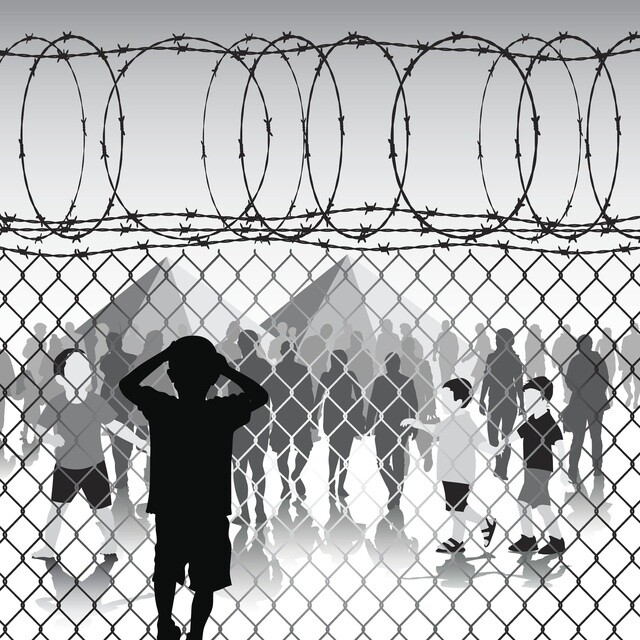hankyoreh
Links to other country sites 다른 나라 사이트 링크
South Korean High Court reverses ruling that prevented refugee from applying for naturalization

A court has found it unlawful to refuse a recognized refugee’s application for naturalization on the grounds that the individual’s bank balance temporarily fell below 30 million won (US$26,500). The court concluded that it was inappropriate for the Ministry of Justice to apply a strict standard on ability for earning a living after previously delaying its naturalization procedures.
The tenth administrative division of Seoul High Court announced on Sept. 7 that it had sided with “K,” a 33-year-old Egyptian refugee, and reversed a first trial ruling refusing his request to overturn a Ministry of Justice decision not to permit him to apply for citizenship.
K came to South Korea in 2009 after being persecuted in Egypt, an Islamic country, because of his Christian faith; he was granted refugee status the following year. In 2014, he applied for naturalization, documenting a bank balance of over 31 million won (US$27,400). Previous enforcement rules for the Nationality Act, which applied in K’s case, stated that applicants for naturalization or their family members must prove their livelihood capabilities with a bank balance of 30 million won or more.
K’s balance subsequently fluctuated by amounts ranging between 1.7 million and 7.4 million won (US$1,500–6,500). In June 2016, the ministry ruled to deny his application, citing “insufficient livelihood capabilities.” K filed suit to have the decision overturned, but the case was dismissed by the first court.
However, the appellate court concluded that the ministry had acted improperly in concluding that K lacked financial capabilities due to the delays that had been caused in the naturalization process. The decision took into account the possibility that K’s balance might vary as the process dragged on for close to two years. While the ministry claimed that general naturalization applications typically take around 17 months, the court concluded that it should have been carried out more quickly on account of K’s refugee status. It also noted that K had a family member working as a schoolteacher in Israel to support him and had his own earnings from work at a movie theater.
The court also stressed that decisions concerning refugees’ financial capabilities should not be made uniformly. Noting that refugees “cannot return to their homeland, and while they may find employment in South Korea, they face a severely limited range of options,” it said the standards should be different from those applied with regular applications.
“Rather than demanding a specific level of financial means [from refugees], the decision should be based on whether [applicants] have the basic self sufficiency capabilities to participate in economic life in the community,” the court said.
By Hyun So-eun, staff reporter
Please direct questions or comments to [english@hani.co.kr]

Editorial・opinion
![[Column] Has Korea, too, crossed the Rubicon on China? [Column] Has Korea, too, crossed the Rubicon on China?](https://flexible.img.hani.co.kr/flexible/normal/500/300/imgdb/original/2024/0419/9317135153409185.jpg) [Column] Has Korea, too, crossed the Rubicon on China?
[Column] Has Korea, too, crossed the Rubicon on China?![[Correspondent’s column] In Japan’s alliance with US, echoes of its past alliances with UK [Correspondent’s column] In Japan’s alliance with US, echoes of its past alliances with UK](https://flexible.img.hani.co.kr/flexible/normal/500/300/imgdb/original/2024/0419/2317135166563519.jpg) [Correspondent’s column] In Japan’s alliance with US, echoes of its past alliances with UK
[Correspondent’s column] In Japan’s alliance with US, echoes of its past alliances with UK- [Editorial] Does Yoon think the Korean public is wrong?
- [Editorial] As it bolsters its alliance with US, Japan must be accountable for past
- [Guest essay] Amending the Constitution is Yoon’s key to leaving office in public’s good graces
- [Editorial] 10 years on, lessons of Sewol tragedy must never be forgotten
- [Column] A death blow to Korea’s prosecutor politics
- [Correspondent’s column] The US and the end of Japanese pacifism
- [Guest essay] How Korea turned its trainee doctors into monsters
- [Guest essay] As someone who helped forge Seoul-Moscow ties, their status today troubles me
Most viewed articles
- 1[Column] The clock is ticking for Korea’s first lady
- 2[Correspondent’s column] In Japan’s alliance with US, echoes of its past alliances with UK
- 3Samsung barricades office as unionized workers strike for better conditions
- 4After 2 months of delayed, denied medical care, Koreans worry worst may be yet to come
- 5[Column] Has Korea, too, crossed the Rubicon on China?
- 6[Editorial] When the choice is kids or career, Korea will never overcome birth rate woes
- 7Hong Se-hwa, voice for tolerance whose memoir of exile touched a chord, dies at 76
- 8US overtakes China as Korea’s top export market, prompting trade sanction jitters
- 9Constitutional Court rules to disband left-wing Unified Progressive Party
- 10Nearly 1 in 5 N. Korean defectors say they regret coming to S. Korea